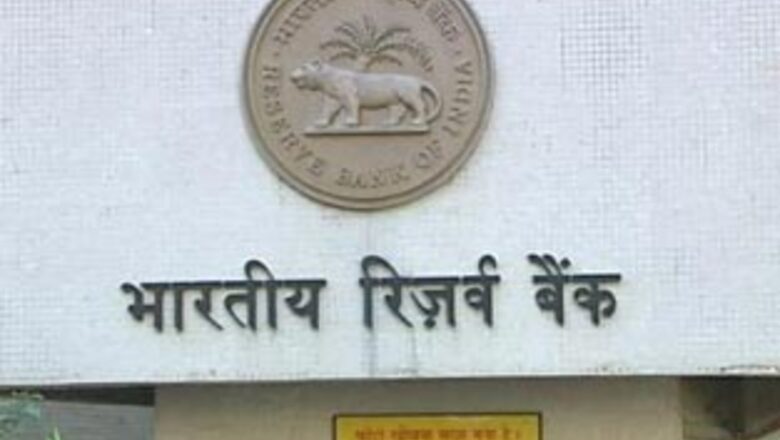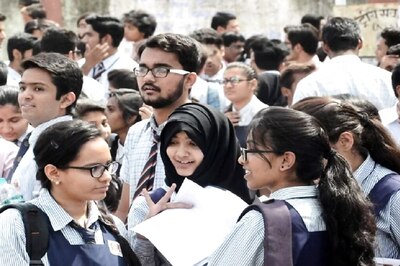
views
Mumbai: The Reserve Bank of India (RBI) may need to step up its market buying of government bonds to head off a sharp spike in yields towards 7 per cent as a result of expected heavy debt issuance in the next few months.
The RBI has cut its benchmark interest rate by a total of 3.5 percentage points to 5.5 per cent in the past four months to counter the impact on the economy of the global financial crisis. So a rise in market yields would be counter productive.
But concerns about the government's rising borrowing and spending plans aimed at countering the slowdown are already driving market yields sharply higher, which may force the central bank to act.
"There are tools in the central bank's artillery which can be used to ease pressure on yields, which have backed up to levels seen before January's rate cuts," said Arvind Sampath, head of rates trading at Standard Chartered Bank, who expects yields to rise by another 50 basis points.
The yield on the benchmark 8.24 per cent 2018 bond hit an eight-week high of 6.49 per cent earlier on Wednesday. Just one month ago, the yield was at a record low of 4.86 per cent. During 2008 yields dropped 2.54 percentage points as the market factored in rate cuts.
But now it is factoring in a wave of government bond supply and so yields are shooting higher.
The government has already raised its 2008/09 borrowing target of 1.35 trillion rupees ($2.8 billion) by 700 billion rupees, or by more than 50 per cent. The year end on March 31. And analysts say it may issue another Rs 300 to Rs 400 billion of debt by the end of March to cover lost revenue from a delay in the auction of 3G telecoms licences.
A federal official said on Tuesday the government may announce additional borrowing on top of extra issuance already approved for 2008/09 in an interim budget on Febuary 16. Extra issuance of Rs 300 billion could see market borrowing this year exceed 2007/08's total of 1.52 trillion by 55 per cent.
RISKS
Analysts say the central bank, the Reserve Bank of India (RBI), could buy government bonds in the secondary market. The RBI is not permitted to buy bonds directly from the government unless there are exceptional circumstances. But circumstances are now exceptional, said Nilesh Shah, deputy managing director at ICICI Prudential. "I think that will happen because at the end of the day when other balance sheets are shrinking, the only option available is to expand the RBI's balance sheet," Shah said, pointing to similar actions by central banks elsewhere.
The central bank's stock of government bonds stood at Rs 565 billion at the end of January. A private placement of government bonds with it would be a first since March 2006. Alternatively, JP Morgan strategist Vikas Agrawal said, the government could step up treasury bill sales rather than auctioning debt. That would go down well with the market because it would have a smaller impact on banking system liquidity, he said.
"If the rumoured Rs 350 billion of additional issuance is entirely conducted via bonds, then the new 10-year yield may sell off by close to 50 basis points as investors would be willing to absorb the additional supply only at progressively higher yields," Agrawal said.
The RBI has already increased weekly sales of 91-day treasury bills by Rs 75 billion since early January. The central bank sells the bills on behalf of the government. Reserve Bank of India Governor Duvvuri Subbarao said last week there was a probability of a change in the government's borrowing calendar if inflows from a proposed auction of 3G telecom licences did not materialise.
The government's fiscal deficit for the nine months of April to December stood at 163.8 per cent of the full-year target, and the budget target of limiting the deficit to 2.5 per cent of gross domestic product has long been surpassed.
Last week, the central bank said the deficit would be at least 5.9 per cent of GDP, and Macquarie Securities expects it to reach 6.5 per cent. Still, some analysts thought the central bank would be wary of trying to hold back yields just now.
"The market would take it as a cue that the central bank is drawing a line in the sand on where yields should be and that is something they (RBI) might not be very comfortable doing at this time," said Gopal Tripathi, a fixed-income trader at HDFC Bank.


















Comments
0 comment